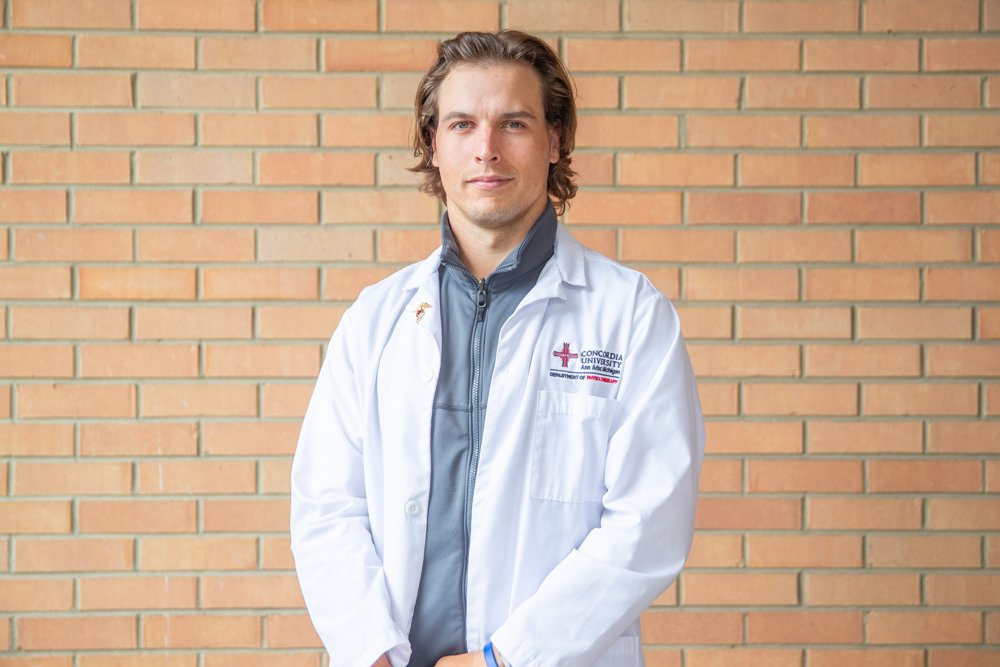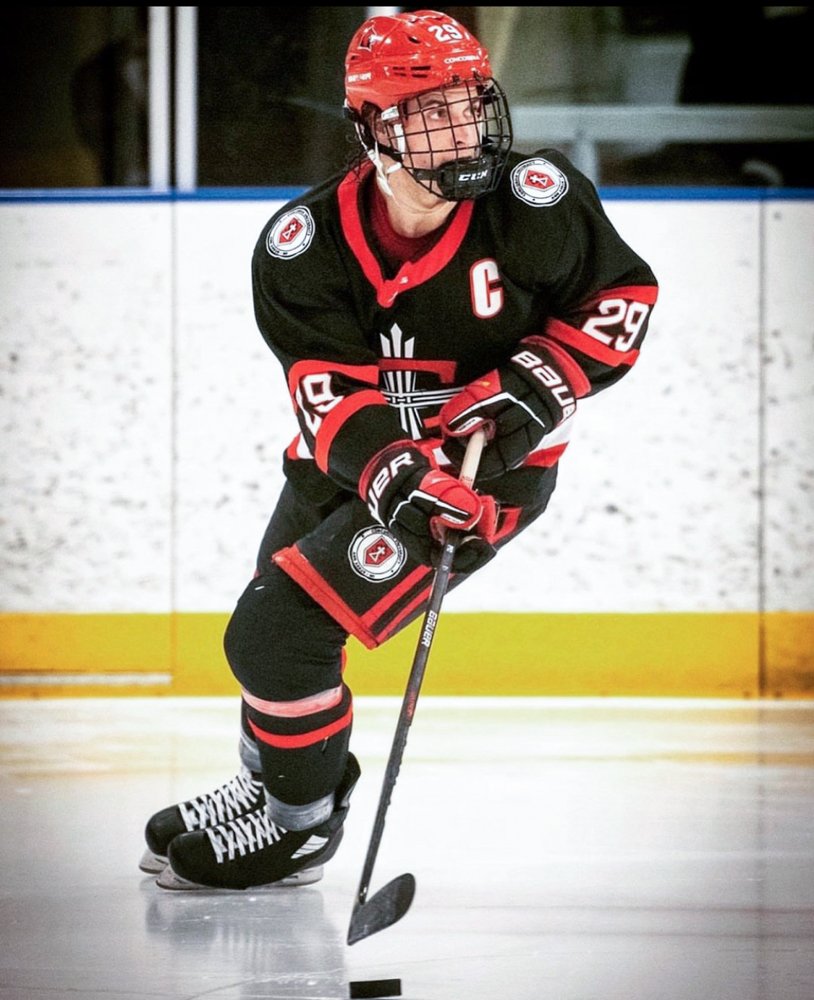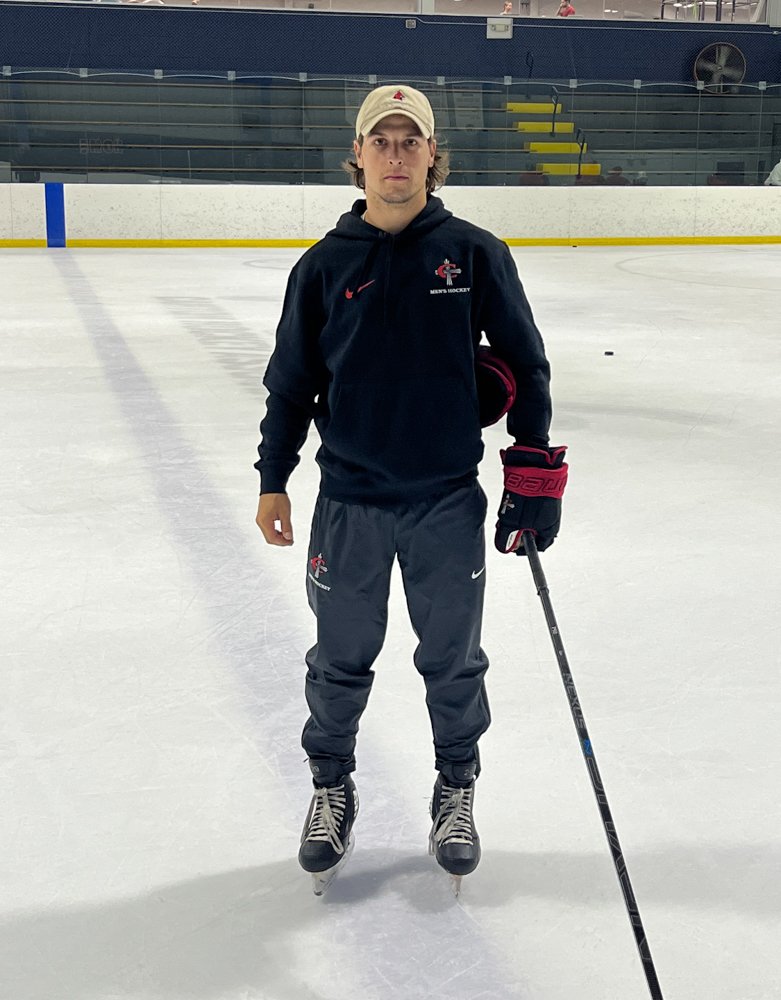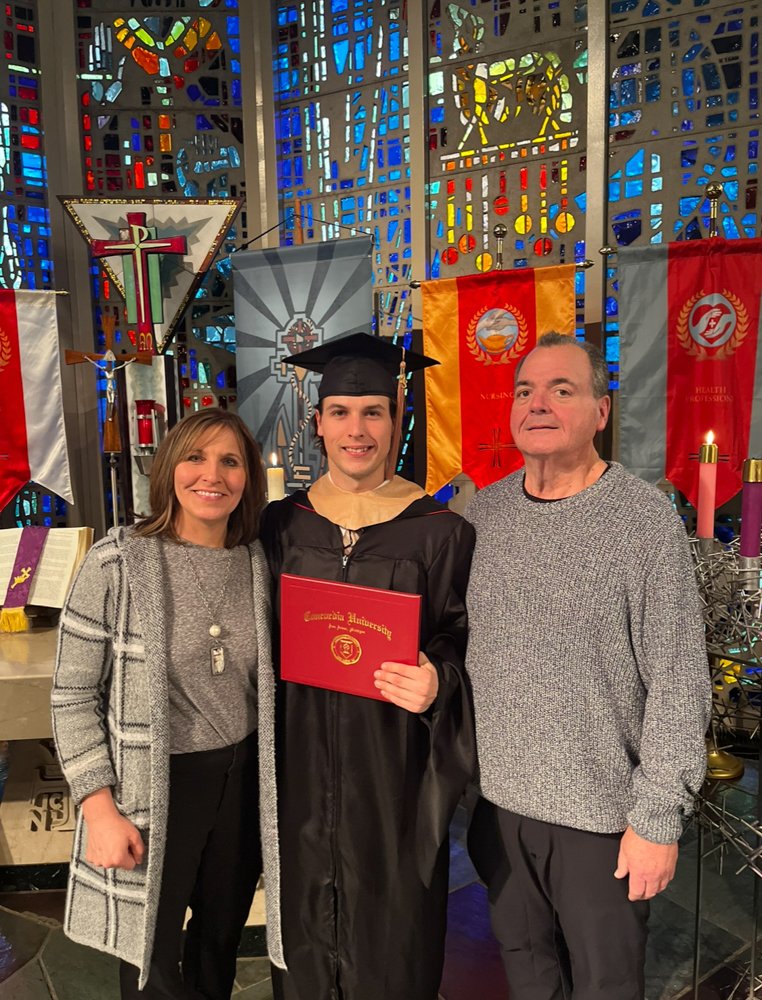
Tyler’s journey at CUAA exemplifies how dedication, ongoing learning, and a supportive community foster personal and professional growth.
Picture this: You’ve earned your Bachelor’s and Master’s degrees, all while working as a campus safety officer and coaching CUAA’s Men’s Ice Hockey team. What comes next? For most, the answer might be to finally take a break, but not for Tyler Groth.
His journey at Concordia University Ann Arbor began in 2018 when he transferred from Trine University to join CUAA’s inaugural men’s hockey team. Since then, his story has been a testament to dedication, resilience, and a passion for growth. Graduating with a Bachelor’s in Exercise Science in 2022 and a Master’s in Leadership in 2023, Tyler is now pursuing a Doctorate in Physical Therapy, DPT, set to be completed by December 2025.
A Community That Feels Like Home
Reflecting on his decision to choose CUAA, Tyler emphasized the deep sense of community and belonging that the university offers. “CUAA gave a community aspect,” he explained. “I transferred from Trine University when I learned they were starting hockey. It provide the opportunity to live back at home, which I hadn’t done since 2015.”
At CUAA, Tyler found more than just a place to study and play hockey; he discovered a nurturing environment that embraced him from day one. “From the first day I walked on campus, it felt like a community,” Tyler recalled. “It felt embraced; it felt like home.”
The Influence of Faith
Faith has been a transformative element in Tyler’s experience at CUAA. He appreciated how the university’s approach was never imposing but rather offered a unique and respectful learning environment. This supportive and open atmosphere allowed him to explore his spirituality at his own pace. Reflecting on his journey, Tyler shared, “Religion was never forced, but CUAA offers a unique learning style for faith.”
This environment of exploration and acceptance played a crucial role in his personal growth. It culminated in a profound and memorable experience: his baptism in the oceans of Hawaii. This pivotal moment not only deepened his faith but also highlighted the supportive and holistic approach CUAA takes in fostering personal development alongside academic and professional growth.
From Player to Coach

One thing that can be hard is transitioning from a player to a coach, but Tyler embraced the challenge with determination and a deep love for the game. “To be honest, it was not the easiest. Some players I played with, and that boundary had to be established,” he admitted.
Tyler’s analytical approach to the game and his experience as a player allowed him to offer valuable insights and strategies to the team. This intellectual engagement with hockey not only fueled his coaching style but also helped him earn the respect of his players. “I love critical thinking when it comes to hockey, and I always knew I wanted to give back to the game that was taught to me,” he shared.

Furthermore, his transition was supported by a strong mentorship from his head coach Trevor Sattelmeier. Their shared vision for the team and common understanding of the game facilitated Tyler’s growth as a coach. “Trevor and I sat down and had serious conversations about starting a second team,” Tyler recalled. “We are very similar when it comes to the game and grasp what it means to be a leader to these players.” With Trevor’s encouragement and Tyler’s intrinsic motivation, he seamlessly moved into his new role, ready to inspire and lead the next generation of players all while earning a Master’s and soon to be Doctorate.
Pursuing a Passion for Physical Therapy
Tyler’s interest in physical therapy was sparked by personal experiences and a deep understanding of the human body’s resilience. “I have always had a passion for how the body works,” he said. “I experienced PT after a major reconstructive surgery on my knee. Working at The Recovery Project, a neuro clinic, solidified my desire to help others.”
Choosing CUAA for his DPT program was influenced by several factors. “The acceleration was the cherry on top,” Tyler shared. “The school’s setup, with its incredible simulation environment and small cohort, impressed me, and The flipped classroom allows us to digest the learning and come prepared to do practical hands-on approaches. Experiential learning is key in today’s society.”
The DPT program at CUAA has provided Tyler with opportunities to build strong relationships with colleagues and faculty. “Building the relationships with colleagues and faculty, as well as the learning style, has been my favorite part,” he remarked. One professor who has been a great mentor to Tyler is Dr. Kristin Shuman.
“Tyler was a student of mine in our Exercise Science program. He was always very excited and interested in the material and how to apply it,” Shuman shared. “When I heard that he was staying on at CUAA to coach hockey and gain a leadership Master’s degree, I was so proud of him. We visited randomly and talked about how he was excelling and how the team was doing. I loved watching him emerge as a professional and take his skill set to the next level.”
Clinical Rotations and Future Aspirations
Tyler’s first clinical rotation was a transformative experience, taking place at Munson Hospital in Traverse City, Michigan. This setting allowed him to engage with a diverse range of patients and medical conditions. “I worked in an acute care setting with ortho patients, neuro patients, NICU patients, ICU, PACU, and wound care,” he recounted. The hands-on experience was invaluable, providing Tyler with a comprehensive understanding of patient care across different medical specialties.
Looking to the future, Tyler dreams of working in a neuro setting where he can focus on treating patients with neurological conditions and injuries. His ultimate goal is to start his own clinic, a place where he can implement innovative treatment methods and create a supportive environment for both patients and staff. Dr. Shuman expressed her confidence in Tyler’s future success: “Tyler is so smart and knows how to apply the content taught to him. His personal demeanor is friendly and welcoming, and I just know he is going to make a great PT. He will care about his patients and try to do everything he can to make them feel better. I am a very proud mentor to Tyler, and I know that he is going to encounter great successes in this life!”
Participation in the Disaster Simulation
Tyler had the opportunity to participate in this year’s Disaster Simulation. Describing the experience as “very overwhelming,” he highlighted the intensity and realism of the simulation. Despite the stress, he recognized its value as an exceptional learning opportunity. The simulation mimicked real-world chaos and unpredictability, providing Tyler and his peers with a critical chance to apply their skills in a high-pressure environment.
He underscored the significance of such simulations for health professionals, noting that they offer a valuable fallback mechanism in emergencies. “Effective communication and taking care of yourself through the whole process are essential,” he emphasized. The simulation allowed students to practice these skills in a controlled setting, ensuring they are well-prepared for the complexities of real-life scenarios.

Tyler offers insightful advice for anyone considering a career in physical therapy, emphasizing the importance of continuous learning and personal growth. “Be open to always learning and developing,” he said. “Find a mentor and continuously seek growth.”
In addition to professional advice, Tyler highlights the necessity of maintaining a balanced life outside of academics and work. “Enjoy your weekends and have a cup of coffee,” he suggested. “It’s easy to just do school all the time, but you have to have a life outside of the degree.”
Tyler’s journey at CUAA is a remarkable example of dedication, resilience, and passion. He continues to inspire and contribute to Concordia’s community in numerous ways. His story demonstrates the value of dedication, ongoing learning, and the supportive environment at CUAA.
Want in?
The Doctor of Physical Therapy program provides comprehensive training for entry-level physical therapy as a generalist clinician over 28 months. It combines scientific principles with leadership skills, covering human anatomy, therapeutic exercise, neuroscience, and clinical decision-making. The curriculum includes 101 semester credits spread across 29 courses and three clinical experiences, totaling 1,280 clinical hours. This accelerated program features hands-on learning in state-of-the-art facilities, integrating interprofessional and simulation activities to enrich your educational experience.
—This story is written by Keara Chaperon, Social Media Manager for Concordia University Ann Arbor and Concordia University Wisconsin. She may be reached at keara.chaperon@cuaa.edu.